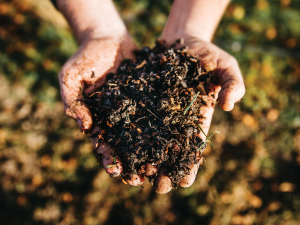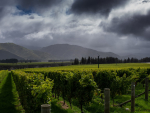When Rapaura Springs bought a vineyard in an arid and windswept pocket of Marlborough's Blind River, building soil health became their focus.
"We knew we had a pretty serious task in front of us, to try and remedy the situation of the soils," says Viticulturist Matt Fox of the fragile land, contoured and overworked before the 2018 purchase.
Spreading grape marc from the Spring Creek winery onto the soils has been a double win, boosting the organic matter of Blind River Vineyard, while redirecting a biproduct of winemaking that can otherwise become a waste stream. "It's a great natural fit," says Matt, noting that the marc - the stems, seeds and skins left over from winemaking - is taken to the site daily during vintage, and dumped on purpose-build pads, before spread, with areas most in need of organic matter targeted. Within weeks you can hardly see the marc, so quickly it is taken up by the soil, he says.
Meanwhile, Rapaura Springs is using mixed species cover crops to improve soil health, with different grasses and legumes chosen for different tasks, from fixing nitrogen to attracting beneficia insects, says Matt, who is an Organic Winegrowers New Zealand representative on the New Zealand Winegrowers Sustainability Committee. The main focus at Blind River is to enhance soil quality "which ultimately leads to better quality wines", he says.
Back at the winery, Rapaura Springs has long had a focus on protecting the resource of its namesake, including through a wastewater bioreactor that reduces biological oxygen demand (BOD) to 50ppm, which is a fraction of the Marlborough District Council stipulation of a BOD count of 5,000ppm. The water is then sent through a membrane filter to remove the particulate matter, with solids collated for mulch and the treated water used for irrigation.
"Our brand is named for the Rapaura Springs that flow through our home," says the company's Global Marketing Lead Joanna Glover. "These springs originate in the Southern Alps. The purity of this water is a reminder that we have a duty to protect our water and take care of our land." She says people increasinly want to understand what they're consuming, where it comes from and how it is made. "The sustainability of our production process is an important part of this equation."












